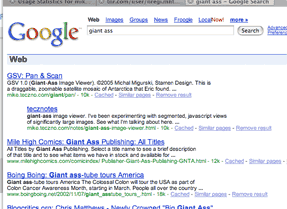tecznotes
Michal Migurski's notebook, listening post, and soapbox. Subscribe to ![]() this blog.
Check out the rest of my site as well.
this blog.
Check out the rest of my site as well.
Oct 31, 2005 11:52pm
boom-boom-boom
Eric:
We're quietly sitting in the office, and hear a BOOM, which is not that big a deal in the sunny Mission. Then another, and then another, and then another, in rapid succession, followed by sirens and helicopters and then more BOOM BOOM BOOM, and finally we turn down the techno and Mike says to me "um... do you think we should go take a look?" We head to the roof and it's not quite the giant robot stomping on buildings that we had imagined, but pretty close - smoke belching from a building on South Van Ness & 16th (about two blocks away) & periodic BOOM BOOM BOOM accompanied by huge balls of flame.
Oct 31, 2005 1:50am
rassafrassin'
Totally forgot to catch Burtynsky when his photographs were shown at Stanford, and again at 49 Geary.
Oct 28, 2005 4:45pm
mixing metaphors
There's a spirited debate winding down at 37 Signals about Flickr and user-generated content. A lot of the comments seem to be dangerously mixing metaphors and points of view to obscure the non-issue at hand.
Jason: "Now, hundreds of thousands of people are taking photos, uploading them to a site like Flickr, making Flickr better, and Yahoo is reaping the financial rewards, not the photographers. That's a pretty big shift. Yahoo is making money off the backs of the collective camera."
Jason, contradicting himself: "I'm not saying there's anything wrong. I'm just saying the whole user-generated content model is an interesting one one where the public does the work and the company gets the financial reward."
The Marxist revolutionary tone sure makes it sound like something is wrong, no? Content-uploaders of the world, you have nothing to lose but your chains.
Steve, contradicting Jason: "What Flickr (and others) have done is shown that photographs are cheap. They're not paying you because if you left, there'd still be thousands of other people who are willing to send in free photographs."
Benvolio, later: "Jason is hinting at a new business model. something like: users sign up to flickr, flickr makes cash from ads hosted on said users images, flickr gives a cut (between 1-10%) of the cash from these ads to that user. not only is this sharing the love but it provides an incentive to flickr users to create, load and promote great content."
Cripes.
I'm seeing a few problematic metaphors in this thread:
- Money is love.
- Photos are content.
- Flickr is a community.
Jason's position in this debate basically boils down to: "Flickr should pay their users for their participation, so users will have a greater incentive to upload quality photos. Uploading quality photos imroves Flickr, which translates into higher advertising revenue for Flickr and Yahoo." Terms like "better" and "share the love" are applied to ad revenue and micropayments, which strikes me as innappropriate.
I believe that Flickr has been successful because of the simplicity of their idea: provide quality plumbing for sharing photographs, in return for non-intrusive advertising or old-economy money. No new-new-economy language about content, community or peer-production, just sharing photos with your friends. The specificity here is important, and Flickr has always seemed to avoid describing their service as a marketplace, a platform, or a community. Of course it is all those things (and many more), but I suspect that is so because their eye rarely strays from the ball. The fundamental reason people join is to share photograhs, while everything else is a nice bonus. Steve (above) is right - there are thousands of people sending in photographs, but they aren't sending them "to Flickr", they're sharing them with their friends. Photographers who want some scratch for their work sell to Corbis or arrange for licensing on other channels.
The last thing Flickr users need is an incentive to upload - a year's worth of frequent massages proves it. People don't need to be convinced to act socially, all they need is a supportive and malleable environment to act in. Flickr can ignore that at their peril.
Oct 26, 2005 6:33pm
keeping change
There's a connection between BofA's Keep The Change program and the Attention Recorder, but at the moment I can't articulate it.
Oct 26, 2005 4:30pm
reblog 2.0
Reblog's 1.0 announcement promised "push-button republishing for the masses", and we've been doing pretty well following that track for the past year or so. Last night, we pushed the button on Reblog 2.0. The concept behind the software has always been a form of attention cagefight: many feeds go in, one feed comes out. Reblog closes the loop between piqued interest and publishing by making the act of marking a link for publication a one-step affair. We've long thought this was a pretty interesting addition to the standard functionality of an RSS reader, and I'm surprised to see that in late 2005, there's not a lot of other software that performs the same task.
In the meantime, Reblog has started to see slow but steady growth. Eyebeam and Rhizome both use the software to publish net art blogs, and Eyebeam has an explicit "curator" role in the fortnightly reblogger. Global Voices Online has expressed strong interest in adapting the project to their multitiered reblogging operation, and Reblg from Broadband Mechanics borrowed the term for a similar idea based on microformat republishing from within the browser. A lot of these uses place Reblog in the role of plumbing: like the mixer in your shower, it's there behind the wall but you never see it. Reblog's output is typically meant to be fed into a MoveableType or WordPress plugin, where it surfaces as a series of blog posts on an HTML site annoted with "Originally by so-and-so from..." attribution notes.
We've been thinking a bunch about expanding this role a bit, so that the RSS output from Reblog carries more weight. What happens when you chain a bunch of Reblog installations together, so that the output of one person's attention stream becomes fodder for the next? You get an omnidirectional passive e-mail substitute, great for washes of "FYI" type information and general interest sharing. In a lot of use cases there's no reason for the output to ever make it to a regular blog. Small, distributed groups can use the software to share information among themselves, and only escalate to the relatively disruptive e-mail level when action or response is required. Alternatively, chaining feeds together could result in a progressive-filtering mechanism, reducing the complexity of a thousand feeds into a few pertinent pieces of information through a pyramid of editors.
So, with the interest of making Reblog a more flexible sharing tool, we worked on version 2.0 with a few broad goals in mind:
- Usability: Reblog's user interface needed to help the end-user manage large numbers of feeds more effectively. Tagging feeds & entries has proven to be the most flexible way to accomplish this. We were also interested in ways of making the interface look less... dorky. There was a lot of techno-cruft that just had to go.
- Extensible Input via a public API: Greasemonkey is pretty damn cool, so we thought it'd be useful to provide for a way to perform common Reblog editing actions via a programmable API. XML is boring to parse, so Reblog now has a JSON-RPC API exposed.
- Extensible Output via support for plug-ins: We were strongly interested in seeing some sort of plug-in ecosystem evolve around Reblog. If the software's useful, it makes sense to provide for a way to adapt it to specific uses. My own guide for this has been Blosxom, a simple blog engine written in Perl.
One huge change that became apparent as we wrote 2.0 was the need to post your own entries, independent of any particular feed. Historically, Reblog 1.x assumes that the target blog would be used for this purpose. In 2.0 we've added a "post item" feature, which acts as stripped-down Blogger or Del.icio.us analogue, and handles one of the primary uses cases suggested by Reblg. This idea has been gaining some traction recently, most conspicuously in Mark Pilgrim's microformat atom store concept. Mark decribes the idea as "having your own private database", but my own takeaway from Del.icio.us has been the value of making such micro-information public. Reblog is built to share. Bud Gibson has been referring to this idea as the xFolk Veg-o-matic, a slice & dice greasemonkey-based browser augmentation that trawls websites for microformatted links and posts them into Reblog for you.
We believe this is pretty cool.
Oct 25, 2005 3:58pm
social vulnerabilities
The always-interesting SEO black hat writes:
There are so many vulnerabilities in Media 2.0 applications that our heads are spinning trying to decide the best 10 to exploit. The problem? People are not designing systems with the black hat / spammer in mind. Its like setting a democracy and saying vote as often as you like. WTF do you think is going to happen? ... We in the BlackHat community often throttle how abusive we are on certain exploits. Part of the min/max game is knowing how hard you can ride an exploit before you break the underlying application. (Word Inventor Mark Cuban on Splogbombs)
Oct 24, 2005 8:56pm
dumb 2.0
Here we go again:
...a new startup called Go BIG Network wants to one-up LinkedIn by focusing on transactions over a network, rather than the network itself. ... The service helps entrepreneurs broadcast needs across their personal networks for free, and across the whole network for a fee (yet to be implemented). (Linking Startups to VC, Red Herring)
This idea didn't work when it was called Vencast, and it's probably not going to work now. Social networks (the meatspace kind) and recommendations work because they're personal, out-of-band, serendipetous. Formalizing such connections into a "Craigslist for businesses" will hit the wall hard. The kinds of people who have good ideas and the smart people who recognize them keep a step ahead of this sort of factory commoditization of the creative process. Last time around, the appearance of such "marketplace" meta-companies was a sign of the impending crash - what does it mean in 2005, when the declaration of Bubble 2.0 is only a month old?
UPDATE: Vencast was not the first: "By compressing the time frame of the typical VC-entrepreneur dance, VC.COM reduces the lamb-to-slaughter cycle to days rather than months."
Oct 24, 2005 4:18pm
"zak001"
My brother's first published article was just posted at Palantir. If you are interested in painting Haradrim, read on.
Oct 22, 2005 6:42pm
irony defined
I keep finding links to Meet The Life Hackers, a New York Times article about attention and interruption, but I can't seem to scrounge up ten minutes to read the damn thing.
Oct 21, 2005 6:26am
arrrrgh, firefox
I'm taking a week to test Attention Trust's extension with a vanilla (for now) installation of their toolkit. I'm excited - the idea of recording a live stream of all my browsing activities to a location I control is super interesting.
So far, so good - all of my "clicks" are being recorded along with HTTP response code and cookie status (not cookie content). I'm using the default ACME-style display to show my browsing behavior, but it's going to be time to modify it to show some difference between recent activity and overall activity. The extension logs all "normal" website visits. It skips subrequests such as XHR, images or stylesheets, and I had to dig around a little to figure out why I wasn't seeing logs of my secure browsing activity - these are disabled by default.
The extension only works in Firefox, and an Internet Explorer version is planned, with no announced release date. I can't possibly recommend a Safari version strongly enough. I've had to switch to Firefox for the duration of my experiment, and I'm really homesick.
A few things that Safari does well, which Firefox does not:
- Comfortable between-tab navigation keyboard shortcuts. Firefox has chosen a finger-bending combo of ctrl-shift-tab.
- Keychain integration - I'm not interested in Mozilla's password storage ghetto, I want to use the system-wide one that already has all of my passwords stored.
- Stable browsing history - when I use Reblog to read my feeds (all day, every day) I like being able to return to the feeds view in Safari without a required page reload. Firefox hits the server every time, which takes time and loses my keyboard-controlled focal spot on the list. This may just be a matter of hacking out some more informative cache-control headers in Reblog.
- General "Macness" - Firefox looks out-of-place, with its own non-Aqua button designs and interface elements, presumably intended to minimize differences between Mac, Linux and PC implementations. Fuck that.
I'll return to these four gripes as the week progresses - some of them may be simple acclimation issues. For now, I'm continuing to give Firefox a try because the attention recorder is the first strong reason I've had to do so.
Oct 15, 2005 7:01pm
painting videos
Duane Kaiser of A Painging A Day has complete videos showing the making of several paintings available on his site.
I wrote a little about time-lapse views of art production last month.
Oct 14, 2005 7:41pm
radii are beatiful
I find these images both significantly more pleasing than splines:
The diagrams in The Shape of Song display musical form as a sequence of translucent arches. (Martin Wattenberg, The Shape Of Song)
Flight density during one week between international airports. Herdeg, Walter. Graphis Diagrams. 4th Expanded ed. Zurich, Switzerland: Graphics Press Corp., 1981. (Visual Complexity)
Oct 14, 2005 12:14am
ends vs. means
From a comment on The Decembrist (scroll down):
Mature people who actually care about the world don't ponder the question "do the ends justify the means," because they know that there IS no end.
Oct 13, 2005 11:49pm
e-mail 2.0
According to Tim O'Reilly, Web 2.0 is about collaboration, data control, participation: warm and fuzzy up-with-people sentiments. I think E-Mail 2.0 will be very different: automation, delegation and other efficiency-oriented goals.
If GTD is any indication, I bet e-mail is about to see an automation renaissance. I've experimented with mail client customization before, and this week I've set up a toy system to experiment with transposing certain GTD ideas (trusted system, ticklers) into automated e-mail actions. My memory for responsibilities and appointments is notoriously awful, and I've not had the best luck with personal-organization tricks such as the hipster PDA - turns out they require a minimum amount of self-discipline.
I want to be able to completely forget about my responsibilities until a specific time in the future when they become important, so I'm playing with the idea of automated e-mail assistants. I've set up remind@teczno.com as a time-delay mail helper. Any message sent to that address is checked for a date and time on the first line - I use PHP's strtotime() function, and it happily accepts inputs such as "tomorrow 1pm" or "november 1 8:00am" (note that this only works as-expected in the U.S. Pacific time zone). A response is immediately dipatched to the sender, with a promise to send a reminder at the specified time in the future. When that time arrives, the original mail is returned.
Combined with the conversations hack, my mail client is starting to take on the character of a diligent yet stupid personal assistant. I've become more confident in my forgetfulness, now that I know I can remind "future mike" of his responsibilies. The reminders take on the context of their sender, so requests from my mobile phone return to my phone. The script is CC:-aware, so any addresses included in the CC: field are in on the reminder. I can imagine expanding this system to be secretly social - there are other needs suitable for mail that could benefit from delegation. For example, GTD relies on "projects" being decomposed into "next actions", which is significantly difficult. A decompose-bot could accept mails with to-do items in the body, and delegate them anonymously to other system users for decomposition into discrete actions. Users of the system would periodically receive mails asking them to decompose someone else's projects into actions, spreading the difficulty of introspection out to disinterested strangers. It's tit-for-tat meets Bittorrent meets porn-incentives for CAPTCHA-cracking.
Until then, feel free to try out Remind-O-Bot. Remember:
- Date and time on the first line of the message
- Sender gets the reminder
- CC: anyone else you may wish to pester
Oct 12, 2005 2:57pm
microsoft's RSS icon
Microsoft is trying to figure out how to represent RSS with an icon.
Their criteria for success are:
- Convey newness, activity, subscription, continuity
- Build on the orange rectangle
- Avoid text
I'm just surprised that they managed to fit a new economy swoosh into the mix:
Oct 10, 2005 4:25pm
the uncool classes
via Kottke:
From London and Berlin to Sydney and San Francisco, civic authorities agree that the key to urban prosperity is appealing to the "hipster set" of gays, twentysomethings and young creatives. But the only evidence for this idea comes from the dot-com boom of the late 1990sand that time is over.
... the lure of "coolness" leads cities to ignore the fundamental issues - infrastructure, middle-class flight, terrorism - that have so much more to do with their long-term prospects. Cities once boasted of their thriving middle-class neighbourhoods, churches, warehouses, factories and high-rise office towers. Today they set their value by their inventory of jazz clubs, gay bars, art museums, luxury hotels and condos.
(Uncool Cities, by Joel Kotkin)
I'm finally reading Jane Jacobs and this article resonated strongly with me. A few other data points:
- San Francisco mayor Gavin Newsom has warned that recovery from a major earthquake may be more difficult, because most of SF's firefighters live outside city limits, many of them across the still-vulnerable Bay Bridge.
- While walking with Eric near 20th and Guerrero, I was surprised to see a cobbler's shop in a neighborhood otherwise full of boho coffee shops and gourmet groceries. I was subsequently surprised by my surprise, because such businesses ought to be plentiful in a well-populated neighborhood, and the lack made me wonder where the locals actually go to take care of such everyday errands as fixing shoes. The cobbler's storefront wasn't exactly booming.
- Still-devastated holes in the ground on the sites of buildings razed to make room for office space at the tail end of Bubble 1.0. Development in the Bay Area seems to occur at the block level, rather than the building level. I was happy to see an apartment building in Berkeley this weekend that had been injected into an oddly-shaped lot, but the general pattern I see in SF and Oakland is for a developer to buy an entire city block, knock down existing business, and put in a "mixed-use" monster.
Oct 9, 2005 3:24am
Noguchi Filing System
Found today via Vox:
A book I read recently has prompted me to try a rather unconventional filing system, the system proposed and used by Noguchi Yukio, an economist and writer of bestselling books about such things. Implementation of the system requires the user to discard many conventional notions about how to store paper documents. (The Noguchi Filing System)
The basic method is to stick your papers to be filed into letter-size envelopes, and store them vertically in order of filing. Any pair of items on the filing shelf will always be in newest-on-the-left order:

A detail that escaped me at first was that folders removed from the shelf don't go back where they came from, but back to the beginning. I'd like to say that I should give this a try, but I've already been beta-testing a spatially enhanced version for most of my adult life: any mail, papers, or books that I wish to file get put down right where I'm standing. Spatial memory is preserved through location, and temporal cues build up over time in the form of stacks of paper and envelopes and crap. My dad uses a limited spatial version, based on the surface area of the kitchen table. It's augmented with a primitive sort of "wiki", in the form of doodles, notes and sketches on most of the white envelopes.
Kidding aside, I like the temporal memory aspect. It's worth noting that an early decision I made with Vox was to organize by first-appearance from the left. Old stuff hovers on the left, new things fly in from the right. When the project was looking at Google News, this choice was strongly accentuated for the longstanding big names such as Powell, Bush, or Blair.
I also like the no-brain feature. "Filing" is divorced from all categorization costs, simpler even than the free associations of tagging. This could probably work very well for small-to-medium organizational needs, but would grow maddening above a certain point. I can imagine that the system would work optimally with a very small set of predefined categories implemented as separate shelves, though all of this raises the question: how to implement something like this for digital files?
Oct 5, 2005 3:21pm
out of context
Mr. Vander Wal met Mr. Migurski in person that month in San Francisco. "It's difficult to explain to my wife what I'm doing, who these people are or how I've met them," he said.
Oct 2, 2005 6:38pm
what's not web 2.0
37 Signals posts "What isn't Web 2.0?" Secrecy and buzzwords among other things.
you could have skipped the filppant list and just said that web 2.0 is a stake in the ground of developing the semantic web.
...which got some rude "buzzword-bingo" retorts. But I like this idea, so here's part of my response:
It's easy to forget that so-called buzzwords ("collaborative", "transparent") have a history - they *mean* something, even if that meaning tends to be obscured over time by thoughtless use. ...the absence of VC funding, secrets, hiring binges and economic incentives were preconditions responsible for the truly transparent & collaborative development surge that got us where we are now.




